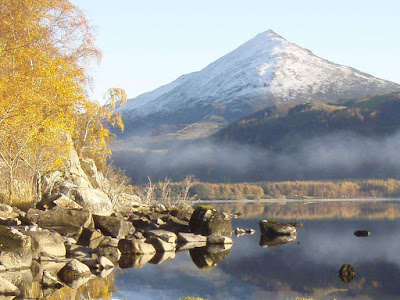About 400 years ago (it might have been 450 or 350 years, doesn't matter, Jezus Christ just keep reading) a family lived near Loch Rannoch. Just a regular family, with a father, mother, son and daughter.
After about forty seconds (it may have been 35 or 45 seconds, but shhh!) Andy, uttering his first spell ever, turned Justus into a cloud and then accidentally blew him away with an exasperated sigh. Not knowing what to do now and being afraid of getting punished by his dad for getting rid of his favourite customer, he started walking and kept walking and walking. Many days later he had reached Hadrian's Wall. He then started walking on top off the wall, not knowing exactly why. After a couple of miles, he suddenly fell. He hit his head against a sharp rock, and died instantly. He was never heard of again by his family, who were very distraught by the loss of both their only son and their favourite thistle buying customer.
Some time later, the daughter of the family, Andy's sister Angie, also ran away. When the water in Loch Rannoch reached a temperature of 4,0 degrees Celsius (it might have been 3,5 or 4,5 degrees, nobody gives a shit so stop doing the math), she started walking into a slightly different direction than Andy had done some time ago. However, many days later she also reached Hadrian's Wall, but arrived at the other end of it. She too started walking on top of the enormously long wall. After a couple of days, she came across something very strange. She noticed a little cloud lingering clumsily close to the wall. The sky was a perfect blue, except for that strange little cloud hanging very low. When she came closer, she noticed that rain was coming out of the cloud. A light but steady drizzle kept pouring down at the same spot. She tried scaring away the cloud by blowing hard at it and waving her arms in a frantic fashion. Reluctantly, or at least so it seemed to Angie, the cloud drifted away. She got down from the wall and examined the place where it had been lingering.
It didn't take long before she discovered the dead body of a human being. She got closer to take a better look and then saw something what made her whole body shiver. A necklace still around the neck of the dead person glistened merrily in the sun, as if it were mocking the grotesque greyness of the decaying body underneath it. Angie had immediately recognised the emblem that made up the bright jewel: A small sword with a two-headed snake hurled around the blade. She then noticed for the first time really the size of the corpse. "It's just a boy..." she whispered, before realising the awful truth that the lifeless body in front of her is her missing brother. Was her missing brother...
After gathering her wits, she gently took the necklace off her brother's body, said a little prayer for him and blew him a kiss. Burying him all on her own her was not an option, so she started walking home again. She needed to tell her parents, they had to know about Andy, so at least they could find a cold and sad comfort in knowing he would never come back anymore. After two days of relentless walking, without getting any sleep, Angie reached a small village called Ardveich. She decided that she would stay the night here, to regain some strength and get some rest. She got a room in an inn called 'Smoky Sleep', not giving the rather strange name a second thought.
Angie died that night in the fire that burned down the entire inn.
Ayren and Allie, the parents of both Andy and Angie, never heard anything ever again about their two lost children. But every year, on Andy's birthday, there was a strange little cloud lingering above the shores of Loch Rannoch. If you looked at it long enough, it seemed to drizzle down little drips that every now and then appeared to change into small flames...


